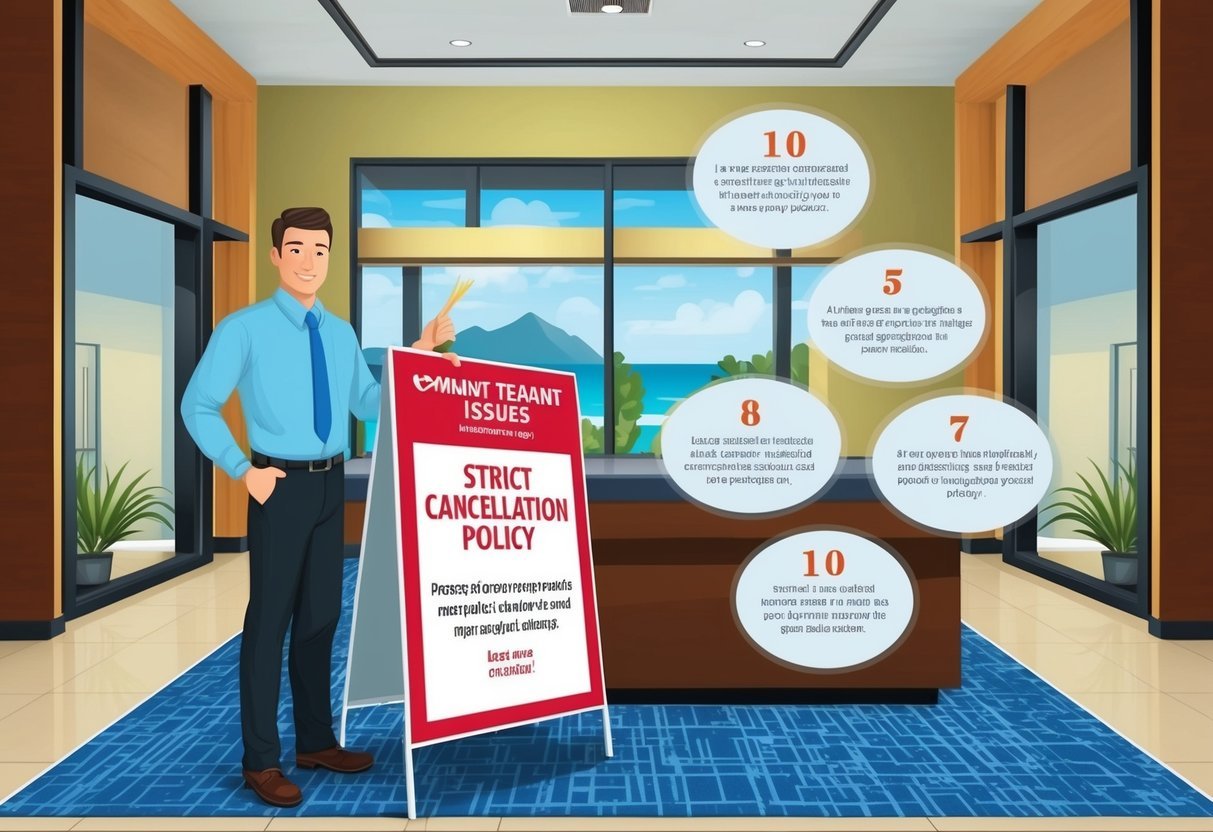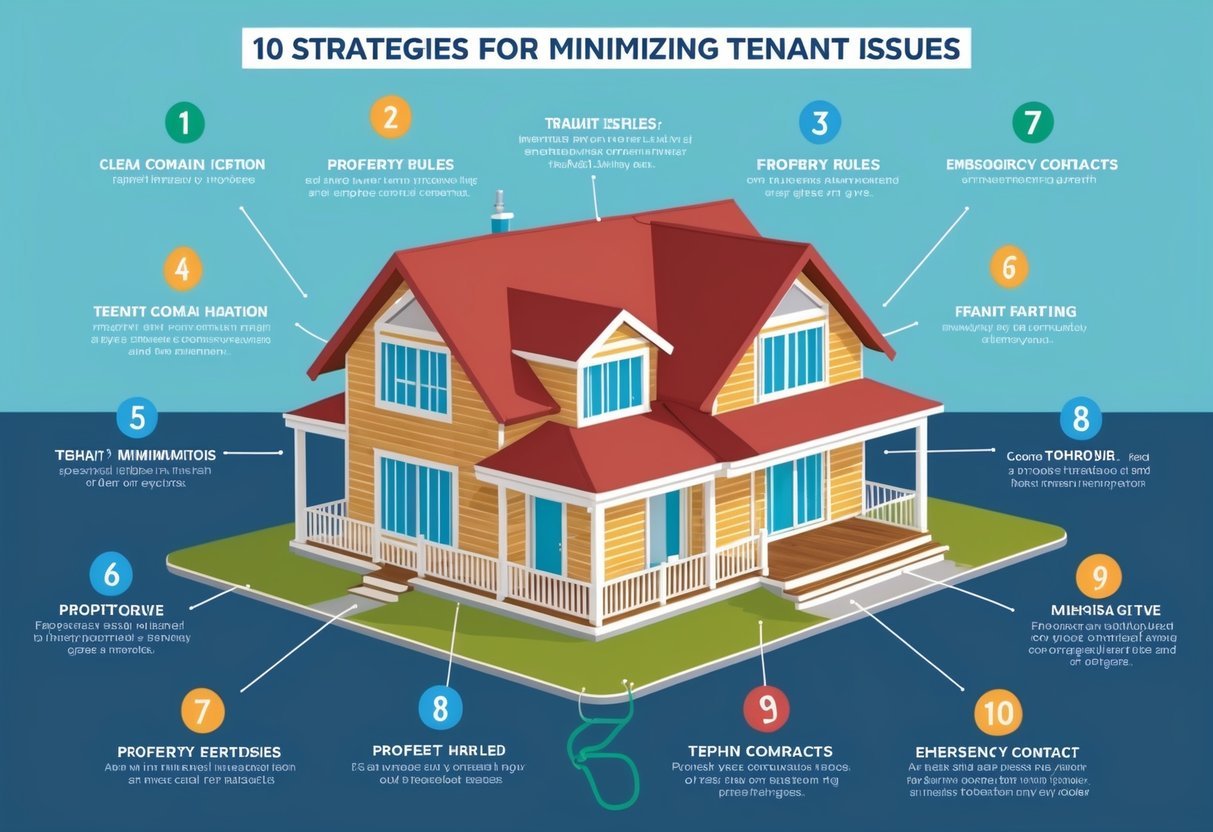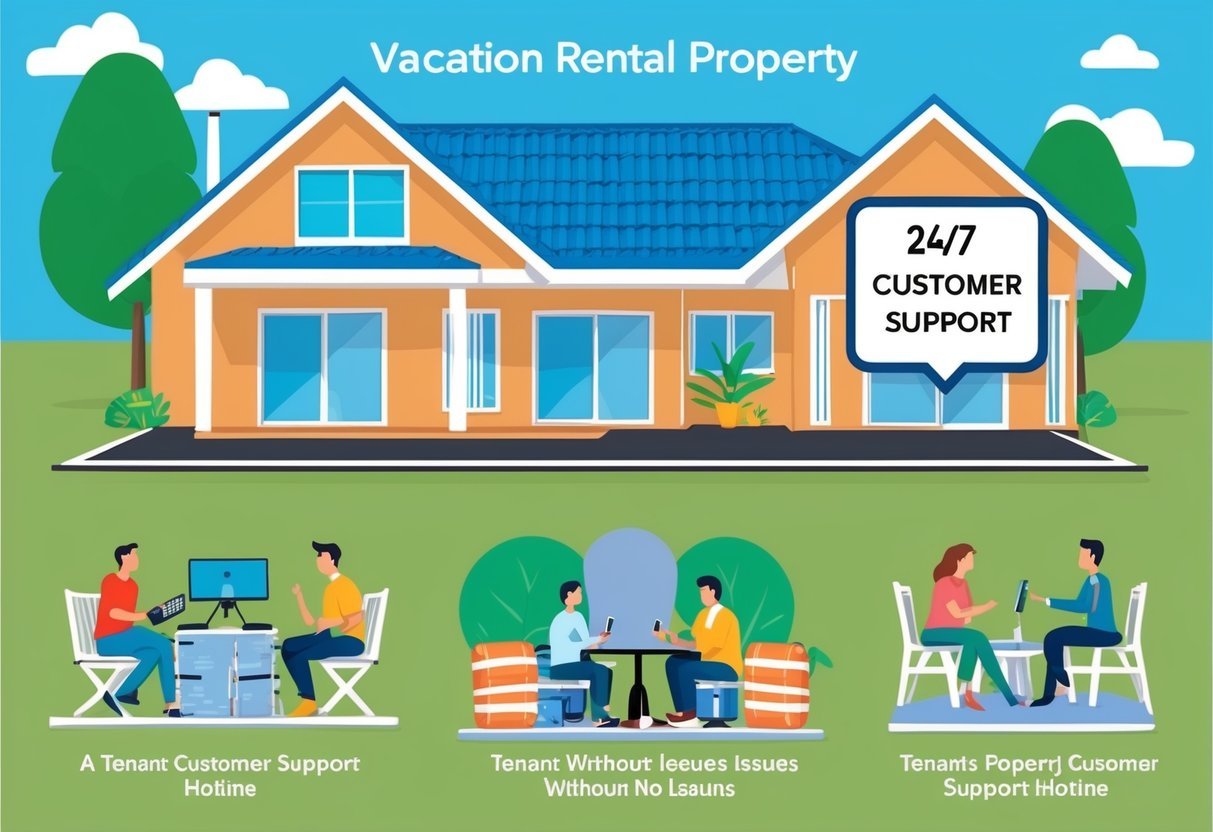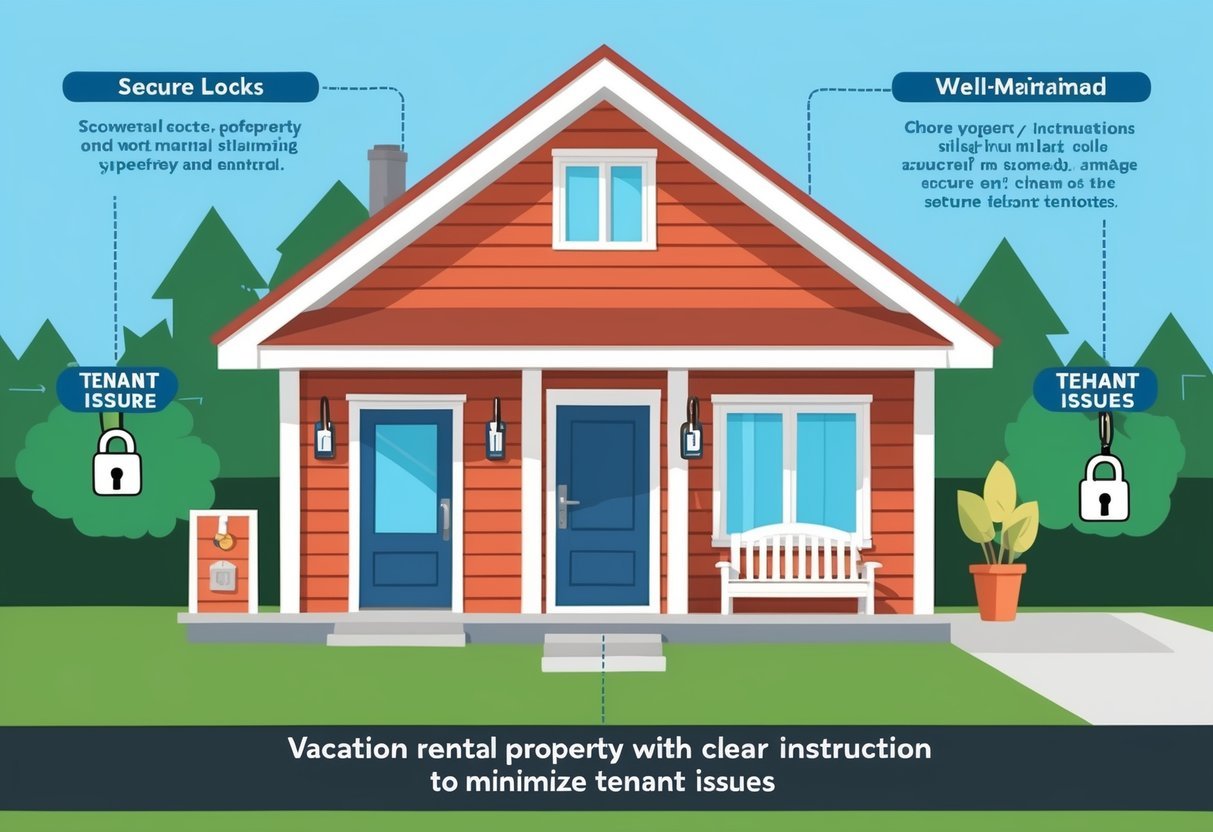In the fast-paced world of vacation rentals, managing tenant issues efficiently can be the key to maintaining a successful property.
Owners of short-term rentals often face unique challenges that differ from those in long-term rental situations.
With the right approach, we can transform these challenges into opportunities to enhance guest satisfaction and improve overall property management.

How can we best handle tenant issues to ensure a smooth and profitable operation? By focusing on proven strategies, we can minimize disruptions and create a more positive experience for both guests and property owners.
Our goal is to equip ourselves with effective techniques that not only address common problems but also enhance the quality of service we provide.
1) Screen Tenants Thoroughly
In the vacation rental business, ensuring that we have reputable and reliable tenants is crucial.
Conducting thorough tenant screenings helps avoid potential issues down the line.
We should utilize comprehensive rental applications to gather necessary information from prospective tenants.
This approach allows us to understand their rental history and suitability as guests in our property.
Running credit and background checks provides invaluable insights.
A credit report reflects a person’s financial responsibility, helping us assess their capability to meet rental payments.
Background checks further illuminate any past legal transgressions that might pose concerns.
A clear understanding of these elements aids in making informed decisions.
Additionally, contacting references and previous landlords can offer firsthand insights into the prospective tenants’ behavior and reliability.
These references provide a better grasp of their potential conduct, ensuring we select individuals who will respect our property and abide by our rules.
Moreover, we should consider implementing a screening process that includes employment verification.
Confirming a tenant’s employment status and income ensures they have the means to honor their rental commitments.
Using an efficient online screening service not only saves time but also enhances security.
The ability to collect and store tenant data electronically ensures we have all relevant information easily accessible while safeguarding privacy.
Customizing our approach to fit our property’s unique needs solidifies our selection process.
Incorporating these steps into our tenant screening protocol allows us to minimize risks.
This foundation enhances our confidence in selecting the best candidates, helping to ensure a smooth and pleasant experience for both us and our tenants.
A thorough screening process is a fundamental strategy in maintaining a successful vacation rental business.
2) Set Clear Rental Policies

Establishing clear rental policies is crucial for reducing tenant issues in vacation rental properties.
By setting clear guidelines, we create a mutual understanding between us and our guests, which helps in preventing potential misunderstandings.
We must communicate these rules effectively.
Details such as check-in and check-out times, maximum occupancy, and pet policies should be explicit and accessible.
It’s also beneficial to standardize our policies using tools like automated responses.
By doing this, we ensure that all guests receive consistent information, minimizing confusion and unnecessary back-and-forth communication.
Our policies should also address cancellation terms.
Defining these terms not only protects us but also sets the right expectations for our guests.
Additionally, making sure rules regarding property maintenance and emergency contacts are prominently shared encourages guests to respect the space and provides them with necessary support.
Finally, we can enhance guest satisfaction and reduce issues by crafting policies that embody a welcoming yet professional tone.
Our ability to strike this balance can significantly influence our guests’ experiences.
3) Maintain Open Communication

We understand that effective communication is key to preventing misunderstandings and tenant issues in vacation rental properties.
Keeping our guests informed and engaged helps build trust and foster positive relationships.
It’s essential to provide clear and concise information regarding check-in procedures, house rules, and local attractions.
By sharing this information early, guests can plan appropriately and feel more at ease during their stay.
Utilizing multiple communication channels ensures our guests can reach us at their convenience.
Whether through email, texts, or apps, we make it easy for guests to contact us with any questions or concerns.
Promptly responding to guest inquiries demonstrates our commitment to their satisfaction.
Quick responses can mitigate potential issues and improve the guest experience significantly.
Additionally, we encourage feedback from guests as it offers valuable insights into their experiences.
This feedback allows us to address any recurring issues and continually improve our service.
We also find that a welcoming gesture, such as a personal message or a small welcome gift, can make guests feel appreciated.
This simple act goes a long way in setting the tone for their stay.
4) Conduct Regular Inspections
Routine inspections are vital in maintaining the condition of our vacation rental properties.
They help us identify potential issues early, ensuring that problems are addressed before they escalate.
We must consider factors like season and location; properties in areas prone to harsh weather might require more detailed inspections, especially at the end of extreme seasons.
By conducting regular inspections, we can catch wear and tear, such as peeling paint or damaged furniture, that might otherwise go unnoticed.
It’s important to check the condition of essential elements like roofs and water systems, especially in locations with snowfall or heavy rain.
These checks are crucial to prevent long-term damage.
During these inspections, we also focus on cleanliness and guest safety.
Observing the condition of smoke detectors and other safety devices is non-negotiable.
Inspections before new guests arrive ensure the space is clean and inviting, helping maintain our reputation and guest satisfaction.
Scheduled deep cleanings are another aspect that we integrate with inspections.
Beyond regular cleaning routines, these deep cleanings address every detail, from the corners of each room to high-use items like appliances.
This thorough approach helps us provide a seamless and enjoyable experience for our guests.
Involving our property management team can further streamline inspection processes.
Having trained personnel conduct these evaluations means issues are handled professionally, aligning with the high standards we aim to uphold in our rental properties.
5) Address Maintenance Issues Promptly

We all know that prompt maintenance is key to keeping our vacation rental properties in top condition.
Making sure that repair and maintenance issues are resolved quickly not only ensures guest satisfaction but also preserves the property’s value over time.
When maintenance problems arise, it’s crucial for us to have a clear communication channel with our guests.
This helps in quickly understanding their concerns and addressing them without delay.
Our guests appreciate it when their issues are taken seriously and resolved promptly.
Utilizing property management software can streamline our maintenance processes.
These tools allow us to schedule necessary repairs, track inventories, and prioritize tasks, ensuring that nothing slips through the cracks.
Establishing a reliable network of contractors and handymen we can call at a moment’s notice is another important step.
Having trusted professionals ready to handle various maintenance tasks means we’re better prepared for any unforeseen issues.
In addition, routine inspections and preventive maintenance should be part of our strategy.
Regular checks help us identify and fix potential issues before they become major problems.
This proactive approach saves time and money in the long run and contributes to a smooth operation.
Use a Professional Cleaning Service

Maintaining a high standard of cleanliness in our vacation rental properties is crucial for tenant satisfaction.
By enlisting a professional cleaning service, we ensure thorough and consistent results.
This approach can enhance the guest experience and help us maintain the property’s appeal.
Professional cleaners bring specialized equipment and expertise to the table.
Their tools and knowledge effectively tackle common problem areas that might be overlooked during routine cleanings, such as behind appliances or inside cupboards.
Hiring experts not only saves us time but also allows us to focus on other aspects of managing the property.
This ensures the rental is always in pristine condition for new guests, optimizing turnover efficiency.
When selecting a cleaning service, it’s important to consider the size and location of our property.
We should also review the service provider’s reputation and reliability.
Fair pricing is another factor.
Setting a reasonable cleaning fee helps us manage costs without deterring potential guests.
Researching local market conditions can guide us in determining competitive rates.
Overall, a professional service assures quality and consistency.
This not only improves guest satisfaction but can also lead to positive reviews.
It’s a valuable investment in the longevity and success of our vacation rental business.
7) Implement a Strict Cancellation Policy

Establishing a strict cancellation policy is crucial for maintaining the financial stability of our vacation rental property.
By doing so, we reduce the risk of last-minute cancellations that can leave our rental unoccupied and affect revenue.
We should clearly define the terms of the cancellation policy, outlining specific timeframes and conditions for refunds.
For example, requiring cancellations at least 14 days prior to check-in for a full refund offers a buffer to find replacement guests.
Clear communication is key to setting expectations.
Our policy should also take into account peak seasons and special events.
During these times, we may enforce even stricter conditions to ensure our property is always booked.
It’s important to inform potential tenants of these policies upfront to avoid any misunderstandings.
Handling cancellations efficiently benefits both us and our guests.
By providing clear, detailed policies, we promote fairness and transparency.
Using an online booking system can help us manage these policies effectively, automating processes for smoother operations.
While a strict policy might seem rigid, it can protect us from lost income and ensure our rental remains booked.
When implemented thoughtfully, it safeguards our business interests while respecting the needs of tenants.
8) Provide a Comprehensive Welcome Guide

Creating a reliable welcome guide is essential for our vacation rental properties.
This guide serves as a resource for guests, allowing them to feel at home from the moment they arrive.
It should cover practical details, such as how to operate appliances and use Wi-Fi, to enhance their stay.
Incorporating local tips and recommendations is a valuable part of our guide.
We include suggestions for nearby attractions, dining options, and transportation advice.
By doing this, we help our guests explore the area efficiently and enjoyably.
By anticipating potential questions, we save time and prevent frustrations.
Our guide also includes essential contact information for emergencies or additional support needs.
This proactive approach builds trust and reassures guests that we’re available to help when necessary.
Clear instructions on waste disposal, recycling, and energy conservation practices are vital.
These guidelines not only maintain property upkeep but also align with our commitment to sustainability.
Guests appreciate knowing how they can contribute positively to the environment.
Visual aids, like photos or simple diagrams, can clarify complex instructions.
Such visual elements make it easier for guests to understand the layout of the property or certain procedures, reducing confusion or errors.
Ultimately, an effective welcome guide enhances guest experience and encourages positive reviews.
By diligently preparing a comprehensive and thoughtful guide, we minimize misunderstandings and foster a smooth, enjoyable stay for all visitors.
9) Offer 24/7 Customer Support

To maintain smooth operations in vacation rentals, offering 24/7 customer support is essential.
Issues can arise at all hours, and immediate assistance ensures tenant satisfaction and prompt resolution.
We need a strategic approach to build an effective support team.
This involves hiring the right people who can demonstrate both empathy and professionalism.
Training them to handle issues efficiently is crucial.
Providing multiple communication channels can enhance the accessibility of support.
Options like phone, email, and live chat allow tenants to choose their preferred mode of contact.
By implementing a rotating staff schedule, we can ensure round-the-clock availability without overburdening employees.
This not only sustains service quality but also helps in retaining talent.
Technology can aid in improving our support system.
Using customer relationship management (CRM) software can streamline tenant interactions and track issues to ensure follow-up.
It’s also important for us to regularly review and assess the support team’s performance.
Gathering feedback from tenants and making adjustments will refine our service over time.
In addition to addressing emergencies, 24/7 support is proactive.
It gives tenants reassurance during their stay, enhancing their overall experience and perceptions of our property.
In the competitive vacation rental market, being available at all times sets us apart.
It shows our commitment to tenant well-being, and it often results in positive reviews and repeat bookings.
10) Use Security Deposits Wisely

Security deposits serve as a financial safeguard for vacation rental properties.
They reassure us that tenants are committed to maintaining the property.
To utilize deposits effectively, we must create clear and concise terms.
A comprehensive lease agreement that clearly states the conditions under which we retain or return security deposits helps prevent misunderstandings.
Transparent communication is essential.
Before tenants move in, we should discuss deposit terms, what they cover, and any potential charges.
If tenants understand the expectations, disputes are less likely to arise.
We can also ensure smooth communication throughout their stay about any potential issues.
When managing multiple rentals, it’s crucial to handle deposits methodically.
Keeping them in a designated escrow account can simplify the process and is often a legal necessity depending on jurisdiction.
This ensures the money is separate from our operational funds and can be easily returned when needed.
Documenting the property’s condition before and after tenancy is a best practice.
Taking time-stamped photos or conducting video walk-throughs helps us justify any claims on a deposit.
By having a clear record, we can avoid potential conflicts regarding damages.
Returning deposits promptly after the lease term is crucial.
A delay can cause unnecessary frustration.
Communicating clearly about any deductions and providing receipts or estimates for repairs establishes trust and fairness.
In instances of disputes, mediation can be a helpful approach.
Engaging a neutral third party to resolve disagreements can save time and maintain goodwill.
Properly managed deposits not only protect our investments but also contribute to positive tenant relationships.
Understanding Tenant Issues
We often encounter challenges when managing vacation rental properties, especially concerning tenant disputes and their effects on property management efficiency.
Addressing these issues is essential for maintaining a positive experience for both property owners and guests.
Common Causes of Tenant Disputes
Tenant disputes can arise due to several factors, often related to misunderstandings or unmet expectations.
One common issue is the misrepresentation of property features.
Guests might find that amenities listed online are unavailable or not as described.
This can lead to dissatisfaction and complaints.
Another cause of discord is related to noise and disturbances.
Whether from neighboring properties or other guests, noise can disrupt a guest’s stay.
Clear communication about property rules regarding noise levels and quiet hours can mitigate such issues.
Cleaning standards are another source of potential conflict.
Guests expect the property to be spotless, and failure to meet these expectations can result in negative feedback.
Proper housekeeping protocols must be in place to prevent this.
Impact on Property Management
Tenant issues can significantly affect our property management operations.
Disputes often result in negative reviews, which can damage our reputation and decrease future bookings.
High-quality guest experiences are crucial for sustaining a competitive edge in the vacation rental market.
Furthermore, addressing these disputes consumes valuable time and resources.
Responding to complaints, coordinating solutions, and following up with guests can be time-intensive, affecting our ability to focus on other essential tasks.
The administrative burden resulting from disputes can also lead to staff burnout.
Handling repeated conflicts without effective resolution strategies can strain our team, impacting overall productivity and morale.
By proactively addressing tenant issues, we can maintain a smooth, efficient property management process.
Effective Communication Strategies
Clear communication with our tenants is crucial to ensuring smooth operations in vacation rental properties.
By setting expectations early and utilizing technology, we can minimize misunderstandings and create a more satisfying experience for both tenants and ourselves.
Setting Expectations Early
We need to establish clear and concise expectations from the very beginning.
This involves laying out comprehensive house rules and providing tenants with a detailed guide on what they can expect during their stay.
For instance, we should outline check-in and check-out procedures, parking guidelines, and any specific property rules.
This helps avoid potential conflicts and confusion.
An introductory email or message sent right after booking confirmation can help set these expectations.
It’s ideal to use bold text or bullet points to highlight critical information.
Offering a Q&A section in this communication can address common queries proactively.
This ensures tenants are well-informed and feel secure in understanding the property rules.
Utilizing Technology for Communication
Leveraging technology can vastly improve our communication methods and efficiency.
Employing tools like automated messaging systems ensures timely responses to tenant inquiries.
Messaging platforms allow us to quickly address routine questions and provide updates or reminders efficiently.
By utilizing apps focusing on property management, we can streamline communication, offering tenants real-time information about their stay.
Features such as digital welcome books can enhance their experience by providing comprehensive local guides and emergency contacts in one place.
This integration of technology not only aids in communication but also supports tenant independence by making essential information easily accessible.
Legal Considerations
When managing vacation rental properties, it’s crucial to navigate legal aspects carefully.
This helps us maintain compliance and protect our investments, focusing on both tenant rights and addressing any rule violations efficiently.
Tenant Rights and Responsibilities
We must ensure that our tenants understand their rights and responsibilities clearly.
Tenants have the right to a safe and habitable living environment.
It’s our responsibility to maintain the property according to local safety standards.
Clear lease agreements detailing house rules, occupancy limits, and any special instructions are vital.
Communication is key.
We should provide tenants with contact information for reporting issues.
Transparency about any fees or deposit conditions also helps prevent misunderstandings.
Regularly reviewing and updating our lease agreements to reflect current laws and regulations is essential to stay compliant.
Dealing with Non-Compliance
Handling non-compliance efficiently protects both our property and tenant relationships.
We should address violations of lease terms, such as unauthorized guests or noise complaints, promptly.
Documenting all incidents and communications with tenants creates a record for legal proceedings, if necessary.
We prioritize following proper legal channels when enforcing lease terms.
Options may include issuing formal notices or, in severe cases, beginning eviction proceedings.
It’s important to familiarize ourselves with local laws governing eviction and tenant rights to ensure all actions are legally sound.
Frequently Asked Questions
In our experience with vacation rentals, key strategies such as efficient remote management and a comprehensive startup checklist are essential.
Additionally, understanding the dos and don’ts can enhance operations.
Below, we address common concerns and explore ways to distinguish your property, maximize rental potential, and select the best management software.
What are the best practices for managing short-term vacation rentals remotely?
Effectively managing remotely involves using technology to our advantage.
Reliable property management tools can help us oversee operations and handle guest communication.
Regular updates from a trusted local contact or management service can keep us informed about property conditions and ensure a seamless guest experience.
What should be included in a startup checklist for a short-term rental business?
Starting with a solid foundation is crucial.
Our checklist includes setting up management software, establishing pricing strategies, and ensuring compliance with local regulations.
It’s important to furnish and equip our property to meet guest expectations, focusing on comfort and convenience.
Finally, having a marketing plan to attract our target audience is essential.
What are the dos and don’ts for running a successful short-term rental?
Do prioritize guest satisfaction with clear communication and a welcoming environment.
Don’t ignore guest feedback or delays in addressing issues, as this can lead to negative reviews.
We should maintain the property meticulously, ensure transparency in listings, and respect community rules to avoid conflicts with neighbors.
How can vacation rental owners effectively maximize their property’s rental potential?
Maximizing potential involves optimizing listings with high-quality photos and detailed descriptions.
Implementing dynamic pricing according to market demand helps increase occupancy rates.
We should also consider guest-centric amenities, such as high-speed Wi-Fi and flexible check-in options, to appeal to a wider range of travelers.
What are the key features that make a vacation rental property stand out to guests?
Cleanliness and attention to detail make a strong first impression.
High-quality bedding, a well-equipped kitchen, and unique décor can enhance a guest’s experience.
Incorporating personal touches like local guides and welcome amenities creates a memorable stay, setting our property apart from generic options.
Which management software solutions are recommended for short-term rental properties?
Choosing the right software is vital for efficiency.
We recommend platforms that offer integrated solutions.
These should include booking management, pricing optimization, and guest communication tools.
Options like Guesty, Hostfully, and Lodgify provide comprehensive features that support our operational needs and help enhance the guest experience.

